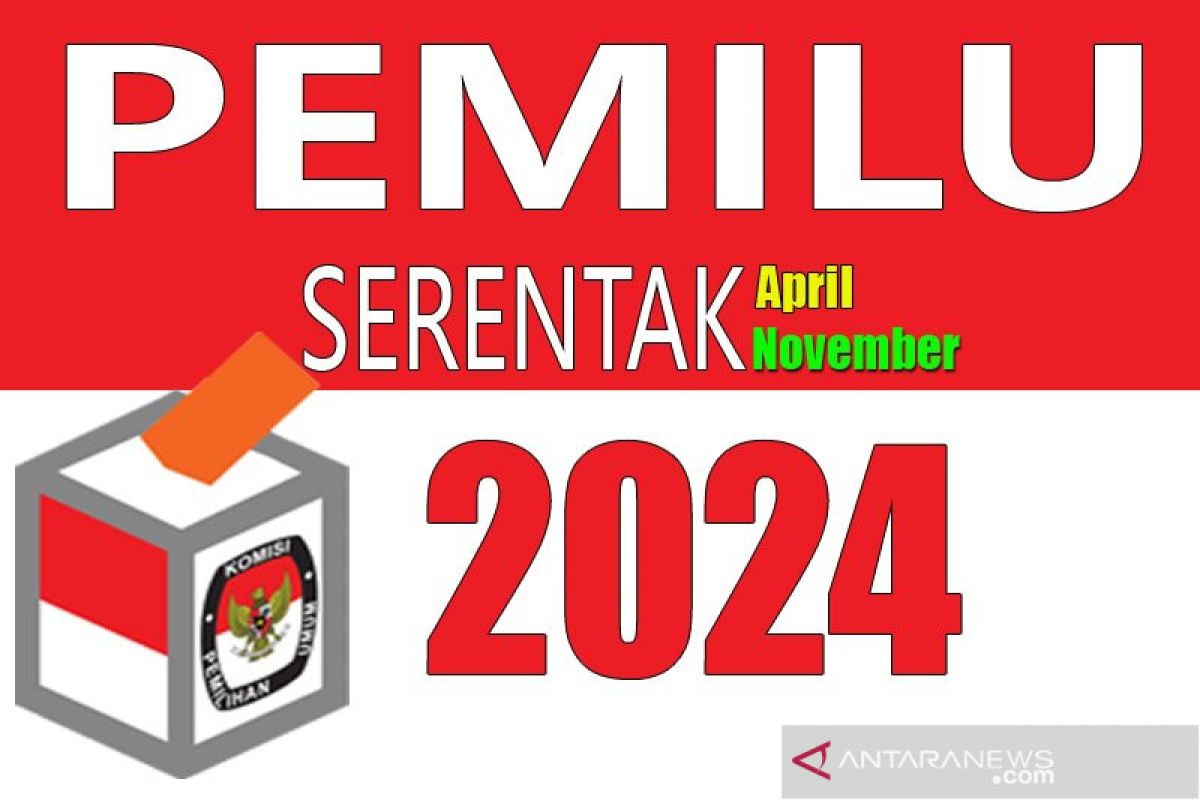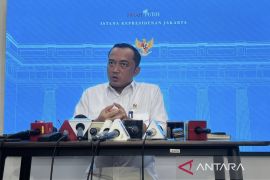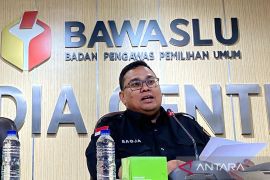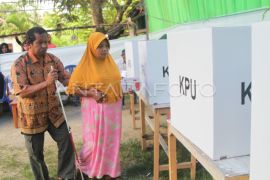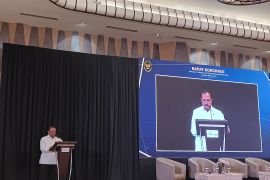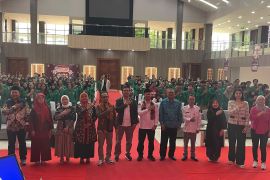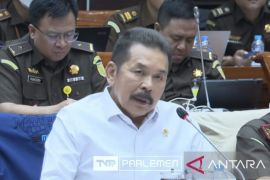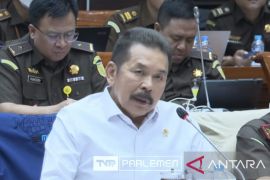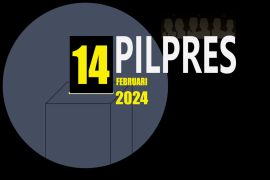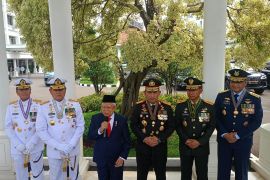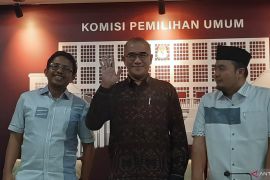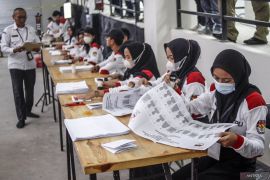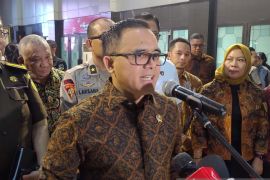For most voters, going to the voting place (TPS), slipping the ballot paper into a box, and then dipping their little finger in a special ink can be an easy process.
However, this is not the case for disabled voters, which is what the Voting Organizing Group (KPPS) should realize by providing fair access to people with disabilities.
Tolhas Damanik, a man with visual impairment from Depok, West Java, drew attention to the obstacles faced by people with disabilities.
Damanik, concurrently the Disabled Rights Adviser for the General Election Network for Disability Access (Agenda), cited an example in Jakarta wherein the TPS was placed in narrow alleys that were inaccessible to people with disabilities.
In order to ensure that the TPS is reachable for all voters, including those with disabilities, the location as well as voting flow at TPS should take into account the condition of people with disabilities.
The first aspect that should be considered is ensuring that people with disabilities are registered as voters.
Moreover, the TPS should be accessible, such as by ensuring that wheelchair users can enter through the door and that the voting box is reachable to them.
"There are technical issues that have to be resolved. We have made TPS for years, so our mind is already stuck there, even though the TPS is not accessible for people with disabilities," Damanik remarked.
The advocacy efforts to ensure an accessible general election for all voters have been made along with the Agenda since 2011.
This is done by creating a checklist model for the General Elections Commission's (KPU's) commissioners at the district and city level and training commissioners to create an accessible general election that can be passed down to TPS workers.
Moreover, the effort involves encouraging people with disabilities to participate as KPPS workers, thereby allowing broader participation to become TPS workers and supervisors.
In the 2019 General Election, the advocacy effort brought real results in a better direction for people with disabilities. Damanik has been registered as a disabled voter in Cipayung where he lives.
The KPPS at his residential area also provides a ballot paper with braille template and facilitates people with disabilities to receive assistance from families to vote.
Moreover, this upward trend is reflected in the awareness of political parties that provide an opportunity for disabled individuals to become the people's representatives, such as during the 2019 General Election, Damanik remarked.
While no disabled people became the people's representatives during that election year, there are already some 40 candidates on the list of legislative candidates across Indonesia.
Meaningful participation
According to the National Socioeconomic Survey's (SUSENAS') Data in 2020, the number of people with disabilities in Indonesia was recorded to have reached 20.85 million.
This figure made people with disabilities a powerful force in determining the course of the country's development.
Despite this relatively large figure, only at least 352,784 disabled voters were recorded in the 2024 General Election, according to the Potential Voters Population List (DP4) that was synchronized by KPU as per February 14, 2023.
Voters with visual impairment comprise majority of this figure, with 110,881 people, or 0.054 percent, of the total voters' projection.
Moreover, there are 94,337 people with physical disabilities, 30,053 people with intellectual disabilities, 58,818 people with mental disabilities, 42,117 people with speech disabilities, and 16,542 individuals with hearing disabilities.
In addition, the Disability National Commission (KND) highlighted the limited participation of people with disabilities in terms of the political aspect.
This is despite the fact that the People with Disabilities Law mandates meaningful participation of people with disabilities at every stage of the general election system.
The General Election Law also mandates that people with disabilities can also participate as the general election organizer.
"One of the causes behind the low participation of people with disabilities in every general election process is societal stigma that is still strongly attached to people with disabilities," Head of KND Dante Rigmalia remarked.
"People with disabilities are often deemed to be incapable of participating in every aspect of societal living because of the disabilities that they experience," he pointed out.
This is despite the fact that the People with Disabilities Law stipulates that the hurdles faced by disabled people are not just caused by their disabilities but also due to their environment.
This condition serves as a major challenge for the protection and fulfillment of political rights of people with disabilities.
Highlighting this issue, the organization outlined five points to realize an inclusive political system and democracy.
The first is encouraging the KPU, General Elections Supervisory Agency (Bawaslu), ministries, and other related institutions to ensure adequate accessibility and accommodation for people with disabilities to fulfill their rights during the 2024 General Election.
The second involves encouraging the KPU, Bawaslu, ministries, and other related institutions to immediately update disabled voters' data for the 2024 General Election.
The third concerns encouraging the KPU and Bawaslu to actively and sustainably involve people with disabilities as general election organizers and supervisors at all levels.
The fourth concerns encouraging political parties to accommodate and provide an inclusive space for disabled representatives, who became the participants of the 2024 General Election.
As for the fifth point, in accordance with its duty and function, the organization will continue to observe and actively involve itself in every process and stage of the 2024 General Election.
This behavior is based on the fact that people with disabilities are citizens that have the same rights related to the general election as others.
This is mandated within several laws, such as Article 28I, point (2) of the Constitution as well as Article 41, point (2) of Law No. 39 of 1999 on Human Rights.
Data and Information Division Coordinator at the KPU Betty Epsilon Idroos has ensured a disabled-friendly TPS for the 2024 General Election.
Despite breakthroughs in the form of braille ballot paper and family assistance, people with disabilities have differing needs, and this is also the case among those with similar disabilities.
For instance, not all people with visual impairment understand braille and not all individuals with hearing disabilities understand sign language.
Thus, general election organizers should take into account the diverse needs of people with disabilities and provide them.
Deputy Chair of KND Deka Kurniawan stated that the organization had inked a memorandum of understanding (MoU) with Bawaslu to encourage the provision of access to people with disabilities.
KND also involves other disability organizations and opens as much space as possible for taking into account complaints and aspirations.
The organization seeks to achieve at least 30-percent representation of people with disabilities akin to women in the legislative election.
No matter how many there are, people with disabilities can fight for their interests based on their unique view in the parliament.
Most importantly, people with disabilities are the ones who best know about their needs and interests.
Related news: Ministry and Unesa to design module for parents with disabled children
Related news: KPU begins verifying documents of 2024 DPR candidates
Editor: Rahmad Nasution
Copyright © ANTARA 2023
